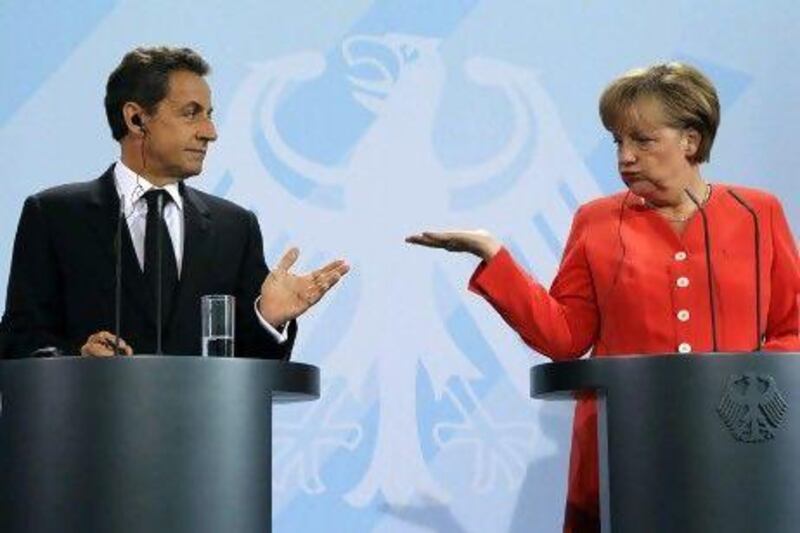Which is more powerful: the advanced industrial nation-state, or the global financial market?
Road to ruin or recovery?
Euro Zone The National charts Europe's struggles as it attempts to through of financial crisis. Learn more
That debate has been going on in economic intellectual circles for some years, but this week we will see a live case-study when the embattled countries of the euro zone present their latest plan for getting the currency bloc out of the structural mess it finds itself in.
It will also have important lessons for Dubai, which is once again facing the challenge of dealing with a bundle of debts falling due next year.
EU summits have come and gone aplenty over the two years in which the debt dramas have been played out, with an air of increasing crisis each time. Each was "make or break" for the euro and the economies of the zone; each came up with a compromise aimed at settling the different priorities of the two most powerful members, France and Germany. Compromise is one word for it; "fudge" would perhaps be a more appropriate one.
And each time, the markets have seen through the cosmetics of smiles, handshakes and detail-lite communiqués. When it became apparent the measures being considered did not solve the EU's structural differences, the markets resumed their attack on the sovereign nations' debts, financial institutions and instruments.
One by one, they picked off the stragglers outside the Franco-German-Benelux core - Ireland, Portugal, Greece, Italy and Spain were all brought to their knees by the unbridled power of global capital.
This time, it is different, we are told. EU officials talk of a clock set at one minute to midnight, and ticking; others talked recently of "10 days to rescue the euro".
There seems to be a new sense of urgency in the run-up to Friday's summit. France and Germany have made progress on moves towards greater fiscal integration, seen as essential to preserve the euro and the EU.
The euro-optimists - those who expect the EU to negotiate salvation among the 17 euro-zone countries - see a three-point strategy emerging from the summit. Fiscal integration will be at the centre of it, with a pledge by euro-zoners to commit to stringent new rules about their own national budgets and tax-raising powers.
Tomorrow's exclusives tonight:
Industry Insights e-newsletter Get the pick of out premium Business content direct to your inbox. Sign up
Agreement on that would pave the way for a new strengthened approach by the European Central Bank, with greater powers to buy sovereign members' debt, although probably stopping short of issuing euro bonds (the Germans don't like that idea).
Finally, EU members (the full 27-strong union) would be asked to agree, over a period of years, to renegotiate treaties to enable the new integration to take place. This is a political minefield, but if a good enough fudge can be choreographed, it might just work, even if only for the short term.
But then it is over to the markets. Their relentless attacks on EU members and institutions have exposed the vulnerabilities of every strategy presented as a "solution", and there's no reason to think they'll stop now.
There is a parallel here with the situation in Dubai where, you could argue, the global sovereign debt crisis kicked off in late 2009 with the Dubai World restructuring.
Bank creditors then found themselves in a weak position with regard to the almost US$25 billion (Dh91.83bn) of loans subject to the restructuring, much like euro-zone financial institutions at the early stage of their crisis. They had to agree to substantial "haircuts" to have any chance of getting their money back, and agreed pretty quickly.
But in later rounds of debt renegotiatons, bank creditors and bondholders have been much tougher in their talks with Dubai corporates, especially government-related entities (GREs). That will make for some pretty hard-nosed confrontations next year, when some $10bn falls due, mainly in bonds issued by GREs.
One element of the EU summit package is said to be a promise not to force private bondholders to take any haircuts, as they were in the Greek crisis. Global investors have insisted from the start this is a crucial condition for their support of any proposed solution.
The lesson of the euro-zone crisis is that markets, led by private bondholders, will always find the weak spot in proposals put forward by nation-states; the apparent lesson from Dubai's new round of bond negotiations is that some governments will try to resist the global markets.
The EU against global capital and Dubai against bondholders are both part of the same struggle: nations versus markets.
twitter: Follow and share our breaking business news. Follow us





